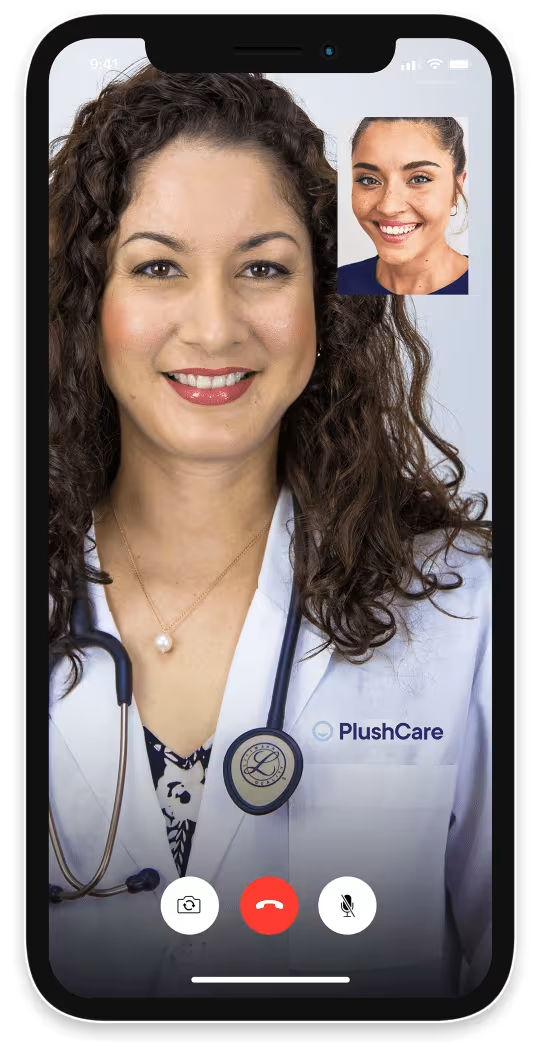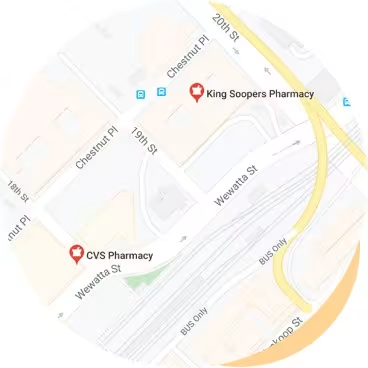- Chronic Care
Sleep Apnea
Sleep apnea treatment available online today
Request treatment for sleep apnea online from our trusted, board-certified doctors and find relief today. Get a new prescription to treat sleep apnea or refill an existing prescription today.*
Book an appointmentSame-day appointments to evaluate sleep apnea
Treat Obstructive and Central sleep apnea
Get relief with doctor-recommended prescriptions
*Prescriptions are provided at the doctor's discretion. Learn more about our controlled substances policy and how to save up to 80% with our prescription discount card. PlushCare doctors cannot treat all cases of sleep apnea. Our primary care physicians can conduct an initial evaluation of your symptoms but may need to refer you to a specialist or for in-person treatment. If you are experiencing life-threatening symptoms, seek emergency medical attention immediately.

Learn about sleep apnea
Sleep apnea (also known as sleep-disordered breathing) is a sleeping disorder in which a person's breathing pauses and then restarts numerous times during sleep. People who suffer from sleep apnea often transition from deeper sleep to lighter sleep. Deep sleep is also a restorative stage of sleep. As such, people who have sleep apnea often have poor quality sleep, resulting in daytime sleepiness.
Sleep apnea can happen to anyone. According to the National Heart, Lung and Blood Institute, an estimated 12–18 million American adults have sleep apnea. There are two types of sleep apnea, each with its own causes and treatment options:
Obstructive sleep apnea: According to the American Sleep Apnea Association, this is the most common form of apnea. It primarily occurs due to repetitive brief blockages of the upper airway during sleep.
Central sleep apnea: This occurs when the muscles controlling breathing do not receive signals from the brain.
When a person suffers from both obstructive sleep apnea and central sleep apnea, it is called complex sleep apnea, also known as treatment-emergent central sleep apnea.
Sleep apnea causes
The causes of sleep apnea depend on the type of sleep apnea.
Obstructive sleep apnea
Obstructive sleep apnea is a very complicated process, but in the simplest terms it is caused by blockage of the upper airway during sleep. The blockage happens when the muscles supporting the soft palate in the back of your throat relax. Due to the airway obstruction, your body is deprived of oxygen. The brain detects the lowering oxygen level in the blood and wakes you up briefly by engaging the muscles in the throat, to get you to breathe consciously and forcefully.
The following risk factors affect your chances of getting obstructive sleep apnea:Weight: Obesity tends to be linked to obstructive sleep apnea. According to the American Sleep Apnea Association, an obese individual is about 7 times more likely to get sleep apnea than a normal weight individual.
Tonsils: Patients with large tonsils have a higher risk.
Age: Older people tend to be at higher risk than younger people.
Sex: Men tend to be at higher risk than women.
Smoking: Smoking increases your risk of getting sleep apnea.
Central sleep apnea
In some people, the body simply stops breathing for a short period of time, and there is no airway blockage. This cessation of breathing is due to the failure of the brain to send signals that regulate the breathing muscles which control the breathing patterns. For some people, the brain may send the correct signals, but the breathing muscles are unable to respond as they should due to chronic disease or the unwanted effects of certain medications.
Central sleep apnea is observed commonly in patients with central nervous system dysfunction due to the following medical conditions:ALS
Stroke
Heart, kidney or lung disease
Other risk factors for this type of sleep apnea include:Age: Older people tend to be at higher risk than younger people.
Sex: Men tend to be at higher risk than women.
Sleep apnea symptoms
People who suffer from sleep apnea have the following symptoms:
Daytime sleepiness
Inability to stay focused
Loud snoring
Gasping for air during sleep
Dry mouth / sore throat when waking up in the morning
Difficult to control high blood pressure
Unexplained weight gain
Frequent nighttime urination
How to treat sleep apnea
Lifestyle changes
For mild sleep apnea, one of the preliminary treatment options includes lifestyle adjustments that can involve the following:
Weight loss
Exercise
Alcohol: Limit or stop alcohol consumption, since alcohol is a depressant and can cause the airway to collapse during sleep.
Smoking: Quit smoking to improve lung condition and reduce chances of developing nasal conditions and infections.
Sleep position: Some people only develop sleep apnea when sleeping on their backs. As such, one way is to use a wedge pillow to help them sleep on their sides. Use of positional therapy has also been known to be effective to keep patients sleeping on their backs.
Fix sinus problems/nasal congestion: Use breathing strips or nasal sprays.
Exercises for the mouth and facial muscles
This is also known as orofacial therapy. These designed exercises strengthen the muscles that control the tongue, upper airway, and lips, so they are in the correct position to keep the airway open and promote normal breathing.
Breathing devices
Breathing devices that provide positive airway pressure can be used to help patients with obstructive sleep apnea. At bedtime, patients simply put on a mask over their nose and/or mouth that is connected by a long flexible tube to a machine. The machine pushes forced air gently through the nose and/or mouth, maintaining air pressure within the upper airway and keeping it open during sleep. There are several types of positive airway pressure breathing devices:
Continuous positive airway pressure (CPAP): This is the most common positive airway pressure device. In the continuous positive airway pressure therapy, the machine is set at one single air pressure.
Bilevel positive airway pressure (BiPAP): Unlike the continuous positive airway pressure device, this device uses a higher air pressure setting during inhalation, and a lower pressure setting during exhalation.
Oral devices
Aside from positive airway pressure breathing devices, some devices that you wear in your mouth can also help to keep the airway open during sleep.
Mandibular advancement devices: These are mouthpieces that hold the jaw in the correct position to keep the upper airway open.
Tongue retaining devices: Unlike the mandibular advancement devices, these are mouthpieces that hold the tongue in a forward position, thus preventing it from obstructing the upper airway.
Surgery
Surgical procedures are often used when all other treatment options are ineffective. Below are some surgeries that aim to increase the size of the upper airway:
Adenotonsillectomy: This procedure removes the tonsils and adenoids.
Maxillary/mandibular advancement surgery: Thisprocedure moves your upper jaw (maxilla) and lower jaw forward to increase the size of the upper airway.
Uvulopalatopharyngoplasty (UPPP): This is a procedure to remove soft tissue on the back of the throat and palate.
Sleep apnea medication
In addition to the above-mentioned treatment options, some medications can be prescribed in conjunction.
Stimulants
Together with other treatments, stimulants can be prescribed to treat excessive sleepiness due to sleep apnea. These medications are considered controlled substances and cannot be prescribed by your PlushCare physician.
Weight loss drugs
Together with diet and exercise, weight loss drugs can be prescribed to help obese patients lose weight, treating sleep apnea.
Allergy and asthma medication
If allergy or asthma is causing nasal congestion and airway obstruction in sleep apnea, the following medications can help:

How to prevent sleep apnea
Lifestyle changes that treat sleep apnea is also effective in prevention. They are:
Weight loss
Exercising
Limiting or stopping alcohol consumption, as alcohol is a depressant and can cause the airway to collapse during sleep
Quitting smoking to improve lung condition and reduce chances of developing nasal conditions and infections
Changing sleep position, as some people only develop sleep apnea when sleeping on their backs. One way to treat this is to use a wedge pillow to help them sleep on their sides.

When to see a doctor for sleep apnea
If you suffer from sleep apnea symptoms and have not received a formal diagnosis, see one of our board-certified primary care doctors to get help. Your doctor can review your history and, if indicated, refer you to a sleep specialist that can perform a sleep studyto determine if you have sleep apnea. The sleep specialist can then discuss the best treatment option for you.
Sleep apnea treatment FAQs
What is the best treatment for sleep apnea?
The best treatment for sleep apnea depends on the type, cause, and severity of the sleep apnea. Sleep apnea treatment options range from simple lifestyle changes to wearing breathing devices to surgical options.
What is the best medicine for sleep apnea?
The best medicine for sleep apnea depends on the cause and severity of the sleep apnea. For obese patients with obstructive sleep apnea, weight loss drugs can be prescribed with diet and exercise to help reduce weight. Stimulants can also be prescribed to treat excessive sleepiness due to sleep apnea. These stimulants are controlled substances and cannot be prescribed by PlushCare physicians.
Can sleep apnea be treated with drugs?
Some drugs can be used in the treatment of sleep apnea. If allergy or asthma is the cause of airway obstruction in sleep apnea, prescription drugs like Ventolin (Albuterol) can help. For obese patients with obstructive sleep apnea, weight loss drugs can be prescribed with diet and exercise to help reduce weight.
What is the newest treatment for sleep apnea?
According to the Mayo Clinic, a new treatment option for patients who are intolerant to positive airway pressure therapy can try upper airway stimulation therapy. The device is implanted in the patient and turned on at night before sleep. During sleep, the device stimulates the hypoglossal nerve causing the tongue to move forward and keeping the airway open.
What causes sleep apnea?
The causes depend on the type of sleep apnea. Obstructive sleep apnea is caused by blockage of the upper airway during sleep. The blockage happens when the muscles supporting the soft palate in the back of your throat relax. In central sleep apnea, the body stops breathing for a short period of time. This cessation of breathing is due to the failure of the brain to send signals that regulate the breathing muscles which control the breathing patterns.
Can sleep apnea kill you?
In general, the probability of sleep apnea directly causing death is low. Usually, some of the health complications associated with sleep apnea can be fatal.
Is sleep apnea dangerous?
Sleep apnea is a serious condition and can lead to dangerous health complications (e.g. high blood pressure, obesity, respiratory failure) if left untreated. Inadequate sleep due to sleep apnea can cause daytime sleepiness that can be dangerous if a person is operating a machine or driving.
Can sleep apnea be cured?
According to a publication from Harvard Medical School, weight loss is key in curing or greatly reducing the symptoms of obstructive sleep apnea.
3 simple steps to get sleep apnea treatment today

Step 1
Book a sleep apnea treatment appointment.
Book a same day appointment from anywhere.

Step 2
Talk to your medical provider regarding your sleep apnea symptoms.
Visit with a doctor on your smartphone or computer.

Step 3
Pick up prescription for sleep apnea treatment.
We can send prescriptions to any local pharmacy.
Related conditions to sleep apnea
Insomnia
Insomnia is a sleep disorder in which the patient is having difficulty falling sleep or maintaining sleep. Sleep apnea disrupts normal sleeping pattern and can cause insomnia.
Sleep apnea treatment pricing details
How pricing works
To request sleep apnea treatment and get a new or refill on your prescription, join our monthly membership and get discounted visits.
Paying with insurance
Membership
$16.99/month
First month free
Visits
Copay
30 days of free membership
Same-day appointments 7 days a week
Unlimited messages with your Care Team
Prescription discount card to save up to 80%
Exclusive discounts on lab tests
Free memberships for your family
Cancel anytime
Visit price with insurance
Often the same as an office visit. Most patients with in-network insurance pay $30 or less!
We accept these insurance plans and many more:
Paying without insurance
Membership
$16.99/month
First month free
Visits
$129
30 days of free membership
Same-day appointments 7 days a week
Unlimited messages with your Care Team
Prescription discount card to save up to 80%
Exclusive discounts on lab tests
Free memberships for your family
Cancel anytime
Visit price without insurance
Initial visits are $129.
If we're unable to treat you, we'll provide a full refund.
Sleep apnea treatment resources
Sources:
PlushCare is dedicated to providing you with accurate and trustworthy health information.
Mayo Clinic. "Sleep Apnea - Diagnosis and Treatment." Mayo Clinic, Accessed October 4, 2023, https://www.mayoclinic.org/diseases-conditions/sleep-apnea/diagnosis-treatment/drc-20377636.
National Heart, Lung, and Blood Institute (NHLBI). "Sleep Apnea." NHLBI, Accessed October 4, 2023, https://www.nhlbi.nih.gov/health/sleep-apnea.
American Sleep Apnea Association. "Sleep Apnea." sleepapnea.org, Accessed October 4, 2023, https://www.sleepapnea.org/what-is-sleep-apnea/
Cleveland Clinic. "Sleep Apnea." Cleveland Clinic, Accessed October 4, 2023, https://my.clevelandclinic.org/health/diseases/8718-sleep-apnea#symptoms-and-causes.
Mayo Clinic. "The Emerging Option of Upper Airway Stimulation Therapy." Mayo Clinic, Accessed October 4, 2023, https://www.mayoclinic.org/medical-professionals/pulmonary-medicine/news/the-emerging-option-of-upper-airway-stimulation-therapy/mac-20431242
Harvard Health Blog. "Weight loss, breathing devices still best for treating obstructive sleep apnea." Harvard Health Publishing, Accessed October 4, 2023, https://www.health.harvard.edu/blog/weight-loss-breathing-devices-still-best-for-treating-obstructive-sleep-apnea-201310026713.
PlushCare content is reviewed by MDs, PhDs, NPs, nutritionists, and other healthcare professionals. Learn more about our editorial standards and meet the medical team. The PlushCare site or any linked materials are not intended and should not be construed as medical advice, nor is the information a substitute for professional medical expertise or treatment.